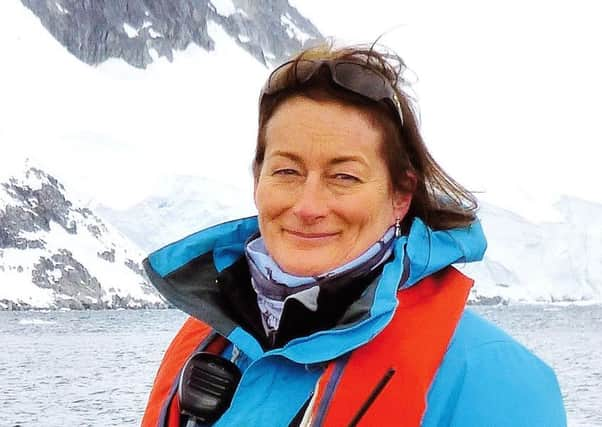Scots scientist wins prize for groundbreaking Antarctica work


Ecologist Dr Kim Crosbie, who comes from Edinburgh, has scooped the Polar Medal for her contributions to environmentally sensitive travel in the frozen continent.
The Queen will present her with the accolade at a ceremony at Buckingham Palace later this year.
Advertisement
Hide AdAdvertisement
Hide AdDr Crosbie has spent much of her career in the most inhospitable places on Earth.
Early ventures to the most southerly region of the planet include three summers spent camping on a frozen island with only 10,000 gentoo penguins for company.
The 47-year-old Scot has also carried out research in the Arctic, where close encounters with hungry polar bears saw her forced to make a run for it on more than one occasion.
She then worked as a guide and expedition leader, taking everyone from film crews to tourists and scientific researchers on trips through the icy landscapes.
Her studies have included identifying the species most disturbed by human visitors to their remote environment, and the results have informed her current role.
Around 40,000 people are due to visit Antarctica during the current summer season, which runs until March. As part of her job with the International Association of Antarctica Tour Operators, Dr Crosbie is responsible not only for their safety but also for minimising their impact on the fragile ecosystem.
She is passionate about her occupation and attributes her love of cold places to a Scottish childhood spent scuffing about in wellies and a woolly jumper in some of her homeland’s most windswept spots.
“We used to spend all our summers on cottage holidays on the west coast,” she said.
Advertisement
Hide AdAdvertisement
Hide Ad“Growing up in cold coastal environments definitely sparked a love of the natural world and natural history as well as giving me an ability to cope with the cold.
“We would go swimming in the North Sea in February. Scottish children are tough.”
But it is the sheer scale of the landscape that never ceases to amaze. You wake up in the morning and it’s like pushing through the wardrobe to Narnia.
“It is so beautiful. No book or photograph can begin to give the sense of scale of that environment. It’s massive, so impressive.
“The most inspiring thing is really to be part of that natural world.
“One of the wonderful things about working down there is that there is nowhere else on the planet you can go where the wildlife has not learnt to be afraid of humans. You land there and the animals just go about their ways.”
The Polar Medal is awarded to people who have made conspicuous contributions to knowledge of the polar regions or provided outstanding service in support of gaining such knowledge.
Previous winners include world-renowned explorers Captain Robert Falcon Scott, Sir Ernest Shackleton, Sir Edmund Hillary and Sir Ranulph Fiennes.
Advertisement
Hide AdAdvertisement
Hide AdPrior to 1904 the honour was known as the Arctic Medal. It was presented twice in the 19th century, with recipients including members of an expedition that set out to discover the fate of Sir John Franklin and his crew, who were lost while searching for the Northwest Passage in 1847.
Being chosen to join them is “a massive honour”, according to Dr Crosbie.
She said: “I find it very humbling, not just because of the people who have won it before me, but because I work with such an incredible group of people. Their level of dedication is huge – people fall in love with the place and become very passionate.
“It’s such an honour, but I also feel a bit sheepish in a way.”